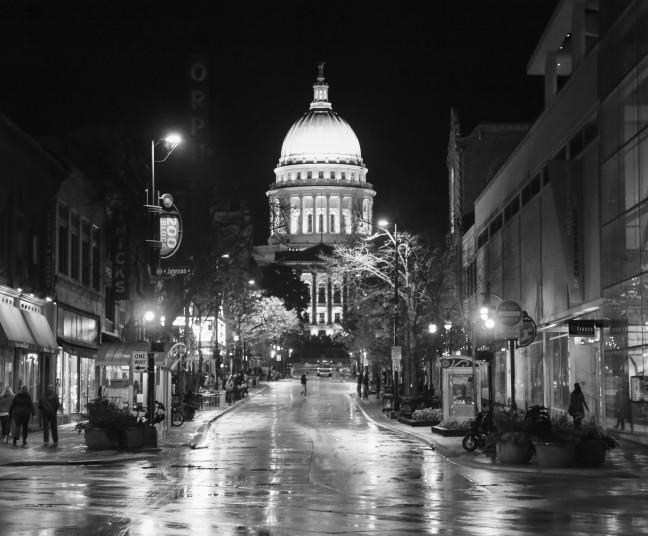Last month, African American and Latino leaders gathered to give the first annual Black and Brown Wisconsin Address. The contents of this event surrounded minority issues that have gone unaddressed for too long.
The black and brown leaders had various speakers including Eve Hall, president and CEO of the Milwaukee Urban League, and local Madison activist Rev. Alexander Gee. As the words kept flowing, it was clear the racial disparities in Wisconsin are bad. In fact, they are terrible.
The various challenges that black and Latino communities in Wisconsin face are unfair and inhibit the young Wisconsinites’ ability to thrive. In this address, Sen. Lena Taylor, D-Milwaukee, deemed Wisconsin the worst state to raise a black child. This claim is based on statistics from various studies, including the 2014 Annie E. Casey Foundation study and the 2017 Center on Wisconsin Strategy study. Taylor spouted disturbing statistics of the difference between African Americans and whites on various critical benchmarks, all of which confirmed Wisconsin is the worst place to raise a black child.
Various other leaders at the address backed the trend in Wisconsin failing its communities of color. Sen. LaTonya Johnson, D-Milwaukee, focused on graduation rates within Wisconsin. She also focused on the topic of education and how it is a critical tool for becoming a successful member of society.
“According to the National Center for Education Statistics, in 2014 and 2015 the graduation rate in Wisconsin was 88 percent while African Americans experienced a 64 percent graduation rate. The graduation rate for white students is 93 percent. The gap is 29 percent between white and African American students,” Johnson said. “This is the largest gap between white and African American student graduation rates in the nation.”
The reasoning behind this large gap in graduation could be due to various factors.
The explanations for low black student graduation rates are vast, but they are all structural and can be rooted within the systemic oppression these communities face in the United States and in Wisconsin. High school students in families at or below the poverty line (many of which have an unemployed parent), work. Youth may work 20 to 30 hours a week while trying to go to school.
Something has got to give in these situations and if there isn’t bread already on the table — the homework, grades or attendance will cave first. This doesn’t even cover the incarceration issues law enforcement and lawmakers have created.
Milwaukee’s 53206 zip code is home to the highest incarceration rate as of 2015 in the entire nation. This zip code’s population is 95 percent African American. The stats speak for themselves — Wisconsin continues to arrest and imprison disproportionate amounts of black men. This not only inhibits high school graduation, but also it inhibits families and good support structures from being founded.
Similarly, the Latino graduation rate in Wisconsin is 74 percent, a full 18 percent lower than that of white students. While this statistic does not express as large a gap as the black-to-white student graduation rates, it still showcases a significant difference between the ethnicities.
Furthermore, Latino students live in fear of deportation tearing their families apart. According to The Cap Times, Rep. JoCasta Zamarripa, D-Milwaukee, criticized Wisconsin Republicans for their work in requiring “local law enforcement officials to cooperate with federal agents to enforce immigration laws, which would mean more Latinos and more immigrants living in fear.” Immigration reform has been a long term issue, but the quasi-recent Deferred Action for Childhood Arrivals program alleviated some of the fear for undocumented youth who grew up here in Wisconsin — a promising step towards supporting Latino immigrants.
Unfortunately, Gov. Scott Walker has been absent on DACA except for the one bipartisan letter he signed with 10 other governors urging Congress to take action and let Dreamers stay in America. This is after he clearly stated his annoyance that DACA was even an issue to be dealt with. What a passive way to support the 7,600 educated youth in your state. Walker and Wisconsin’s legislators have immensely failed their black and brown youth.
Over the years, Wisconsin has proven to not care about its minorities. This is reflected in despicable acceptance of the poor quality of life seen in the local communities of color. Determinants of what many layman call “quality of life” are human capital, social capital, environmental health, physical and mental health, access to resources, discrimination or lack thereof, the list goes on and on.
Monetary and social resources dictate the success of a person’s career and on a much more basic level, they determine the fate of a person’s body. If a demographic is systematically neglected and oppressed, all of these factors are negatively affected. This has happened and will continue to happen unless something is done.
The black and Latino leaders of Wisconsin are correct in their assessment. Wisconsin is a repeat offender of perpetuating discrimination and sustaining racial disparities. It may be statistically the worst place to raise a black child, but it doesn’t have to be. The state address also provided some discussion about possible resolutions even though there were no definite legislation proposals.
Hall suggested minorities need to take advantage of job opportunities currently in Wisconsin like those with the upcoming Foxconn Technology Group, which manufactures flat-screen televisions in a plant located in Mount Pleasant. But not all minorities can make the commute to the plant’s location. Thus, the issue can’t be solved with a few new factory jobs. The issue is systemic racism and needs to be addressed with legislation and financial support for communities of color.
Black and brown leaders coming together to address and tackle disproportionate issues of racial and ethnic disparities in Wisconsin is huge. It shows dedication and self-propelled momentum from targeted communities. More work like this needs to happen and the people and lawmakers need to support it.
Emiliana Almanza Lopez (almanzalopez@wisc.edu) is a sophomore majoring in sociology and environmental science.


